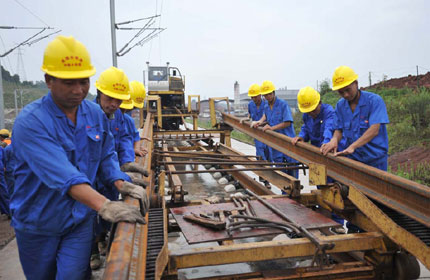Great experiment, great success
Updated: 2014-07-02 07:54
(China Daily)
|
|||||||||||
Much to the disappointment of the doomsayers, Hong Kong has survived the gloomy predictions of post-handover failure. To the satisfaction of those who love the city, the achievements of the HKSAR over the past 17 years provide firm evidence of the success of the "one country, two system" experiment.
A high degree of autonomy, the essence of the policy, remains unchanged. The HKSAR enjoys more power to formulate its own policies and to administer its own society for itself, than do many states do under a federal union system.
Citizens have continued to enjoy rights and freedoms since the handover, as demonstrated by the mass rallies held on Tuesday and on numerous other occasions. Tens of thousands of people are allowed to freely express their diverse views. Individual critics and protesters as well as unreceptive media and political groups are free to criticize the government. This wouldn't be imaginable under colonial rule.
The capitalist system is flourishing. The Heritage Foundation has, for the 20th consecutive year, ranked the city as having the world's most liberal economy.
The rule of law and the independence of the judiciary; foundations of any civil society, remain very much intact. The World Justice Project ranks the Hong Kong SAR 16th overall out of 99 economies in the 2014 Rule of Law Index, ahead of Belgium, France and the USA.
It is to the credit of the system that the city still ranks third most important financial hub in the world after New York and London. In the IMD ranking, after occupying the top slot for many years, the SAR still remains the 4th most competitive economy globally. Supported by a robust economy, the unemployment rate remains at a 16-year low of 3.1 percent--equivalent to full employment.
Of course, no road is completely smooth. As its neighbors become increasingly competitive, the HKSAR faces a rising numbers of challenges including a widening wealth gap, a shortage of housing and lower upward social mobility.
Radicalism, stoked by these problems, has been rising. It has also been agitated by dissidents trying to hijack political reform with regards to the process for electing the Chief Executive.
In pursuit of their own political agenda, certain of these radicals have resorted to unlawful activities in the hope of coercing the central and HKSAR governments into accepting an election mechanism of their own design-even if it contravenes the law.
Radicalism and coercive strategies can not work with the central government.
Incidents in other countries demonstrate that radicalism does not help advance democracy, more likely resulting in the compromise of the rule of law, destabilization of society and chaos in the economy.
(China Daily 07/02/2014 page8)
Related Stories
Vice-president: HK youth should protect rule of law 2014-07-02 07:51
Abstract paintings by HK artist on show in Beijing 2014-06-30 15:07
HK chief poll has 'no legal standing' 2014-06-30 07:27
Mainland-backed HK to disappoint doomsayers 2014-06-27 05:24
Today's Top News
Palace Museum feeling the squeeze of visitors
Myanmar pagoda replica given to China
US sends 300 more troops to Iraq over concerns
Hong Kong at the crossroads
Japan pushes for military reform
China's move to domestic software pressures foreign companies
Chinese firm sues Apple for trademark infringement
Emperor penguins waddling to extinction, study finds
Hot Topics
Lunar probe , China growth forecasts, Emission rules get tougher, China seen through 'colored lens', International board,
Editor's Picks

|

|

|

|

|

|





